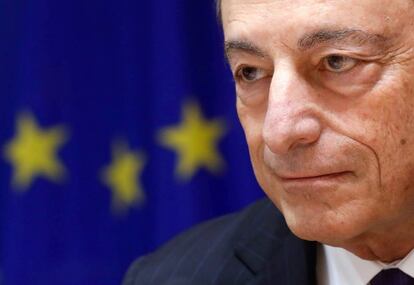The European Monetary Fund’s great challenge
Brussels is proposing a fund to shore up the euro and a common finance minister for the entire EU

The European Commission is due to present a detailed plan for a European Monetary Fund (EMF), one that mirrors the IMF and that will serve to bail out countries in crisis, shore up their banking systems at no cost to taxpayers, and support a future budget fund capable of handling the kinds of problems that affect some partners more than others – the so-called asymmetrical shocks.
This project, which EL PAÍS has revealed today, comes hand in hand with another institutional plan for a future European finance minister who will centralize economic guidance for the eurozone and the EU, now dispersed between the vice-presidency of the European Commission and the presidencies of the Eurogroup and the Economic Stability Mechanism (the bailout fund).
French President Emmanuel Macron has made a crusade out of greater economic and political integration
The dual plan is a key issue for the EU, because it threads together the various parts of a major challenge: completing economic and monetary integration. Structural deficiencies in the same nearly prevented EU authorities from avoiding a euro debacle when the Great Recession that began in 2008 deepened and continued to reverberate throughout 2011 and 2012.
This is the right time to discuss this project, because there has been ample debate over previous papers within the institutions, from the European Parliament to the Eurogroup, inside some national parliaments (though not the Spanish one), among experts, economic and social committees, unions, employers’ associations and university circles. Therefore, the plan does not contain empty dreams.
It is also opportune from a political standpoint. In this sense, it provides an answer to a triple challenge. First, to the challenge posed by EU institutions, which have been mulling its underlying ideas for five years. Second, to the need for an ambitious horizon of mid-term economic policy to counteract the regressive ideas of nationalism and populism, which have so far been contained at the polls this year, but which are still too strong. And third, to the urgent need to reinforce the bonds of the Franco-German engine in these delicate times.
The plan provides an answer to a triple challenge
On one hand, French President Emmanuel Macron has made a crusade out of greater economic and political integration, and that compensates for blunders in domestic policy. Consolidating expectations for European advancement is also a good way to ensure the regeneration of France and a new rebalancing role for that country within the EU.
On the other hand, it is necessary to have clear ideas, no matter how controversial they may seem to some, regarding the deep complexities of negotiations for a governing alliance in Germany. These ideas should also shore up the more pro-European flanks of Germany’s electoral spectrum, the Christian Democrats and the Social Democrats.
Among the list of virtues attributable to these latest projects from Brussels, it bears noting that they skillfully sketch out a viable meeting point between France’s ambitious needs and Germany’s pragmatic realism. It is a crossroads where Spain must necessarily feel at home.
English version by Susana Urra.
Tu suscripción se está usando en otro dispositivo
¿Quieres añadir otro usuario a tu suscripción?
Si continúas leyendo en este dispositivo, no se podrá leer en el otro.
FlechaTu suscripción se está usando en otro dispositivo y solo puedes acceder a EL PAÍS desde un dispositivo a la vez.
Si quieres compartir tu cuenta, cambia tu suscripción a la modalidad Premium, así podrás añadir otro usuario. Cada uno accederá con su propia cuenta de email, lo que os permitirá personalizar vuestra experiencia en EL PAÍS.
¿Tienes una suscripción de empresa? Accede aquí para contratar más cuentas.
En el caso de no saber quién está usando tu cuenta, te recomendamos cambiar tu contraseña aquí.
Si decides continuar compartiendo tu cuenta, este mensaje se mostrará en tu dispositivo y en el de la otra persona que está usando tu cuenta de forma indefinida, afectando a tu experiencia de lectura. Puedes consultar aquí los términos y condiciones de la suscripción digital.








































